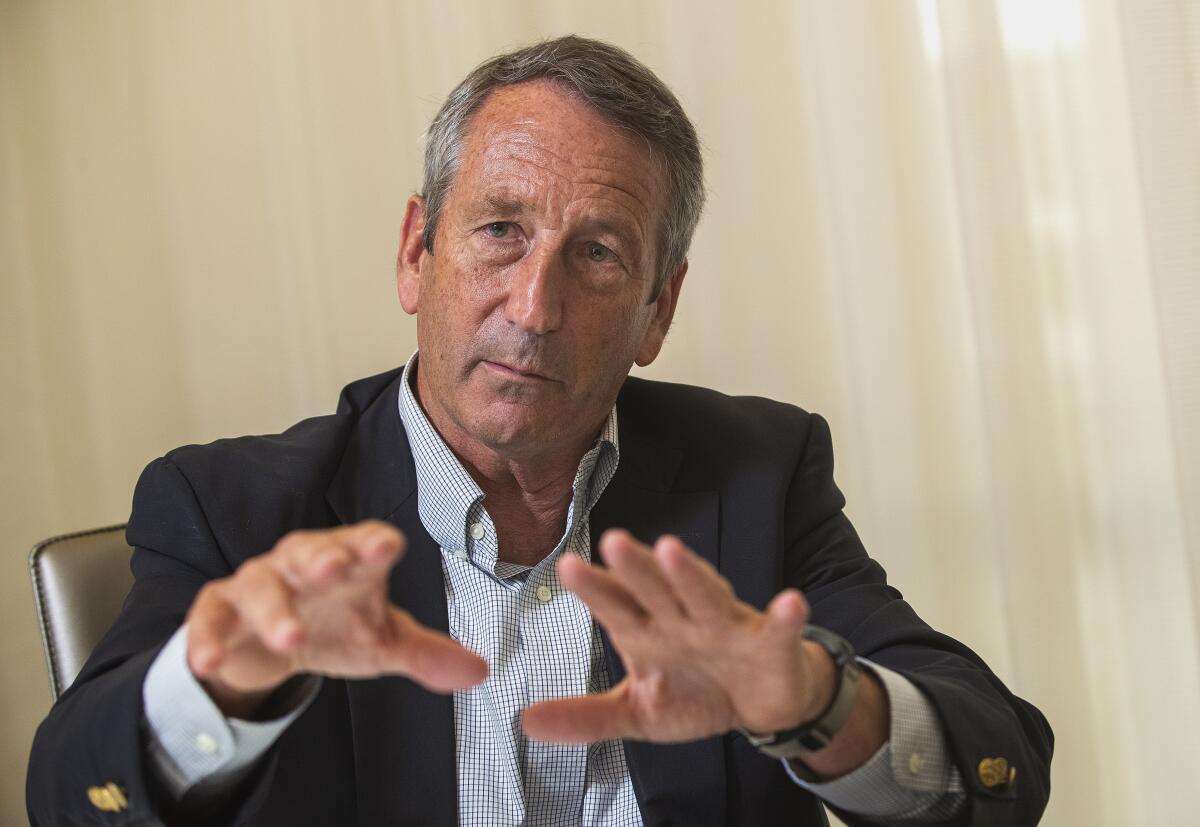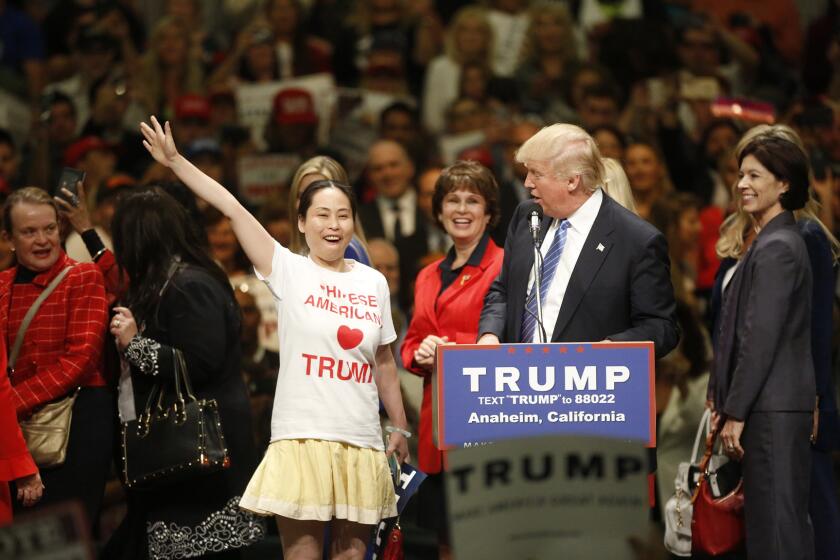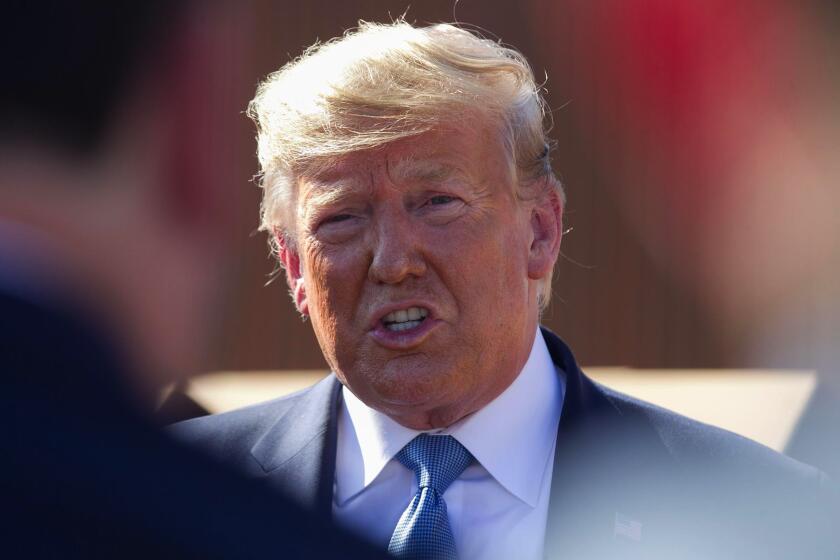This Republican challenging Trump is trying to remind the GOP how much it hates the deficit

- Share via
Mark Sanford had gone to Iowa at the start of his long-shot bid for the White House to try to persuade Republican voters that the party had lost its way, succumbing to $1-trillion-a-year deficit spending under President Trump.
On a farm in far northern Iowa, the former governor of South Carolina found an audience of one, a farmer hunched over repairs on his tilling machine, Sanford recalled last week during his first campaign swing through California since declaring his candidacy for the Republican presidential nomination.
Sanford delivered a message about fiscal restraint that sounded a lot like what Republicans told voters all the time when Barack Obama was president. But when the Iowa farmer, and some other Republicans, hear the same message during a Donald Trump presidency it doesn’t sound financially prudent to them — it sounds disloyal.
“Wait a minute. You’re the guy who is running against Trump,” Sanford recalled the farmer saying. “Then he goes, ‘The president said he is going to send a manned flight to Mars. I believe they are going to discover ... rocks on Mars that are worth more than gold. We will bring them back to the country. And we will be able to pay the national debt off.’ ”
Sanford winced as he summed up that encounter a few days later at USC, where he was the keynote speaker at a conference on political tribalism.
“I’m thinking, ‘Where are we going with this?’ ” Sanford said. “If we just follow the tribalism thing — be for or against Trump, forget about the issues — we are going to end up in some very, very weird places.”
And Sanford will end up in a very difficult spot, trying to generate debate on his signature issue, the national debt, while mounting a meaningful challenge against a president who remains highly popular within his own party.
Despite nascent competition from Sanford and two other Republicans — former Massachusetts Gov. William Weld and former U.S. Rep. Joe Walsh of Illinois — and a budding impeachment inquiry into his actions, President Trump appears unlikely to be seriously challenged from inside his own party.
President Trump’s reelection campaign has raised millions of dollars, announced a $10-million ad buy and put thousands of ads up on Facebook in an effort to take advantage of the crisis that threatens the White House.
Trump’s approval rating among Republicans hovers somewhere close to 90%. And the power of incumbency already has been clear. The South Carolina Republican Party canceled its primary election, costing Sanford a chance to campaign with a home-field advantage. (A lawsuit filed Tuesday by two party members asks the courts to reverse that decision and restore the “first in the South” primary.)
Although once positioned as a rising star in GOP politics, Sanford now stands solidly on the periphery. He was first sidelined in 2009, when he lied about an extramarital affair, claiming he had been hiking on the Appalachian Trail when he actually had been on a romantic getaway in Argentina with his mistress.
Sanford managed to resuscitate his political career and, in 2012, win back his seat representing a House district along the South Carolina coast. But he did not rally around Trump, instead charging that the president had “fanned the flames of intolerance” and presented so much misleading information it seemed that “facts don’t matter.”
Last year, GOP challenger Katie Arrington rode a late Trump endorsement to a primary victory over Sanford. (Though she would lose to a Democrat in the subsequent runoff.)
When Sanford entered the presidential race in September, Trump responded with mockery. Via Twitter, he reminded voters of Sanford’s 2009 affair and his loss in last year’s election. Lumping him with the other Republican challengers, Trump taunted them as “the Three Stooges.”
Cautions about deficit spending used to be the common currency among Republicans and Trump. From 2011 to 2016, Trump railed about government red ink at least 190 times, according to a Washington Post tally. In a typical tweet in 2012, the then-businessman chastised President Obama: “Scary — while @BarackObama has been POTUS for 1.6% of America’s history, he has amassed 33.3% of the total debt.”
Trump said during his run for the White House that he would entirely eliminate the accumulated debt by the end of his second term. Once in power, the president and his party increased defense spending to record highs and passed a 2017 tax cut that congressional budget watchers predicted would add $1.5 trillion to the deficit over a decade.
Donald Trump lost badly in California in 2016; 2020 could be even worse for him, the latest Berkeley Institute of Governmental Studies poll finds.
The White House said the tax cuts would “pay for themselves” with an attendant growth in the economy. But the debt has grown $3 trillion during Trump’s tenure, to $22 trillion, and his administration’s budgets now project that red ink will reach $29 trillion by the end of a second term.
“On the Democratic side it’s more versus more, and on the Republican side it’s just denial,” Sanford said, arguing that Republicans believe voters won’t notice deficits before the 2020 election. He sees the country soon confronting “the biggest financial storm our country has ever seen outside the Great Depression.”
Sanford said he sees many indicators that suggest a major economic fall. One he mentions most frequently: the growing gap between the nation’s total household wealth and its gross domestic product. The former now outstrips the latter by more than 5 to 1, leading some analysts and Sanford to believe “we are in an asset bubble.”
Americans should fear an economic calamity and Republicans a political one, Sanford said. He notes how the Great Depression pushed Franklin D. Roosevelt to power, leading to “a whole lot of progressive policy that went the opposite way of where conservatives want to go.”
Rep. Will Hurd, a Texas Republican who represents a big swath on the U.S.-Mexico border, has come to be seen as a bellwether on impeachment.
The candidate will sometimes range beyond fiscal issues. He criticizes Trump’s flogging of institutions, his exploding of previous conservative orthodoxy against tariffs, and a caustic tone that can emerge “tweeting some strange message out” at 3 a.m. With his family’s South Carolina plantation suffering from record tides and saltwater intrusion, the candidate can also give personal testimony to rebut the president’s disbelief in climate change. Sanford insists: “The most conservative thing of all is to say, ‘Where do the facts lead?’ ”
Still, Sanford said, he intends to keep the bulk of his attention on “a financial hurricane” he sees coming. He hinted that he plans to spend a lot of his time in the coming days in New Hampshire, the “Live Free or Die” state, noted for its political independence and financial rigor — and its early primary.
Notwithstanding his meeting with the farmer who would balance the budget with Martian riches, Sanford said he has heard from other Republicans who are urging him onward.
Many of them may be in the shadows, for now, but he said he has heard from more than one: “We need to have a conversation as to what it means to be a Republican. We need to have a conversation about spending and debt, which Republicans just don’t talk about anymore.”
More to Read
Get the L.A. Times Politics newsletter
Deeply reported insights into legislation, politics and policy from Sacramento, Washington and beyond. In your inbox twice per week.
You may occasionally receive promotional content from the Los Angeles Times.














